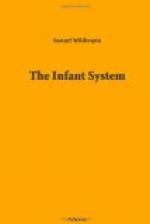This article we only use
Whenever it may be our wish
To speak of some determined thing,
As thus;—the bird, the
ox, the fish.
By which we mean not any bird,
That flying in the air may be,
Or any ox amongst the herd,
Or any fish in stream or sea.
But some one certain bird or ox,
Or fish (let it be which it may)
Of which we’re speaking, or of which
We something mean to write or say.
Remember these things when you see
The little words, a, an, and the.
These words so useful, though so small
Are those which articles we call.
Nothing can be more absurd than to compel young children to commit to memory mere abstract rules expressed in difficult and technical language. Such requires a painful effort of the mind, and one calculated to give a disgust against learning. Grammar was formed on language and not language by grammar, and from this it necessarily follows, that children should acquire a considerable store of words from a knowledge of reading and of things, before their minds are taxed by abstract rules. To be thoroughly understood they require words to be compared with words, and one word to be compared with another; and how can this be done without the memory being amply supplied with them previously. Such simple instruction as this chapter directs may easily be given; but to attempt much more would be like endeavouring to build an elegant and ornamental structure before you had collected materials to build with.
CHAPTER XX.
THE ELLIPTICAL PLAN OF TEACHING.
Method Explained—Its success.
* * * * *
“He tried each art.”—Goldsmith.
* * * * *
All persons acquainted with children are aware of the torpor of some minds, and of the occasional apathy of others, and to this it is necessary to provide some counteraction. This is done effectually by what is called the elliptical plan, according to which, words are omitted in a narrative or poem repeated by the teacher, for the purpose of being supplied by the children.
These exercises are very agreeable to the children, and by them some features of the mental character become conspicuous. Children are usually sensible of their need of instruction, but if they can make it appear that any of their statements are original, their delight is especially manifest. There seems, too, a dislike at first, to take any trouble to arrive at the truth; careless children will therefore guess several times; but an observant teacher will at once perceive that there is no effort of the understanding, point it out to the child, and thus prevent its recurrence.
Dr. Gilchrist observes, in a letter sent to me, “You have now the whole method before you, and I shall boldly stake all my hard-earned fame, as a practical orientalist, on the salutary consequences that will spring from the adoption of short elliptical tales at your interesting institution.”




